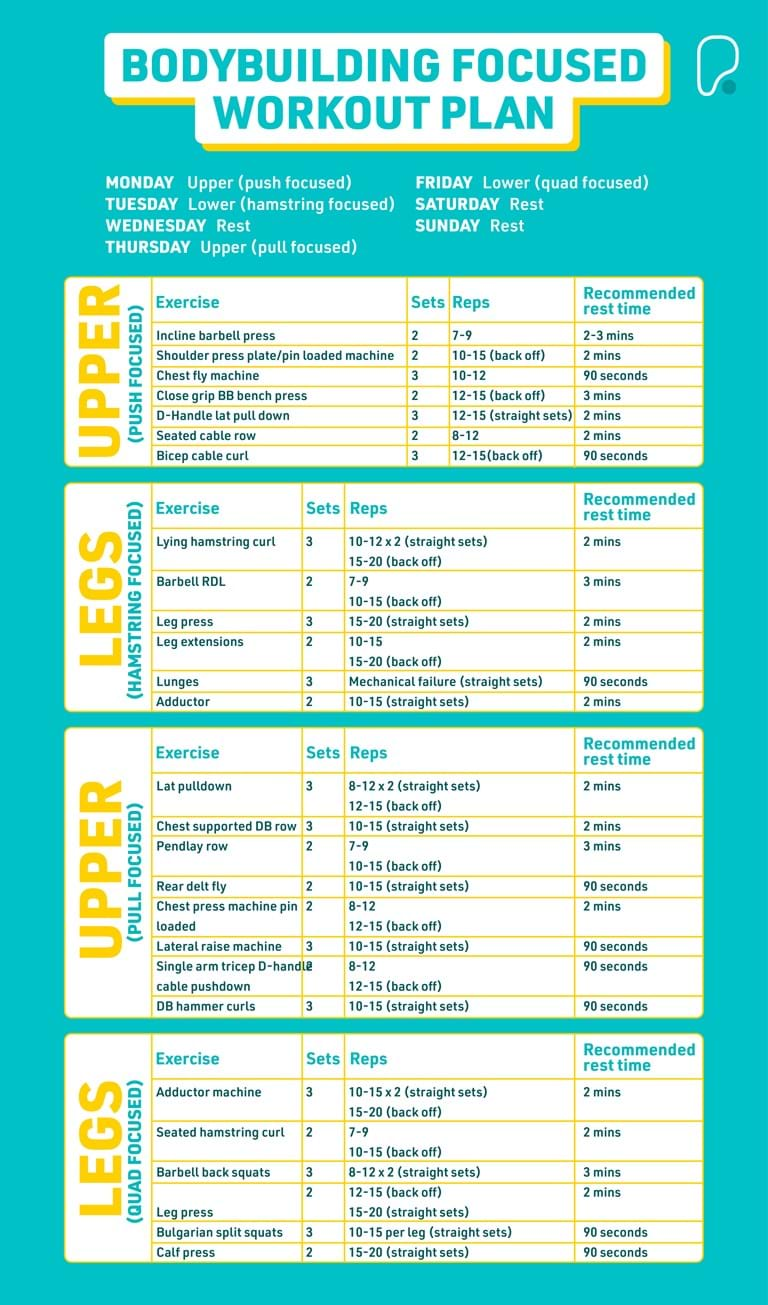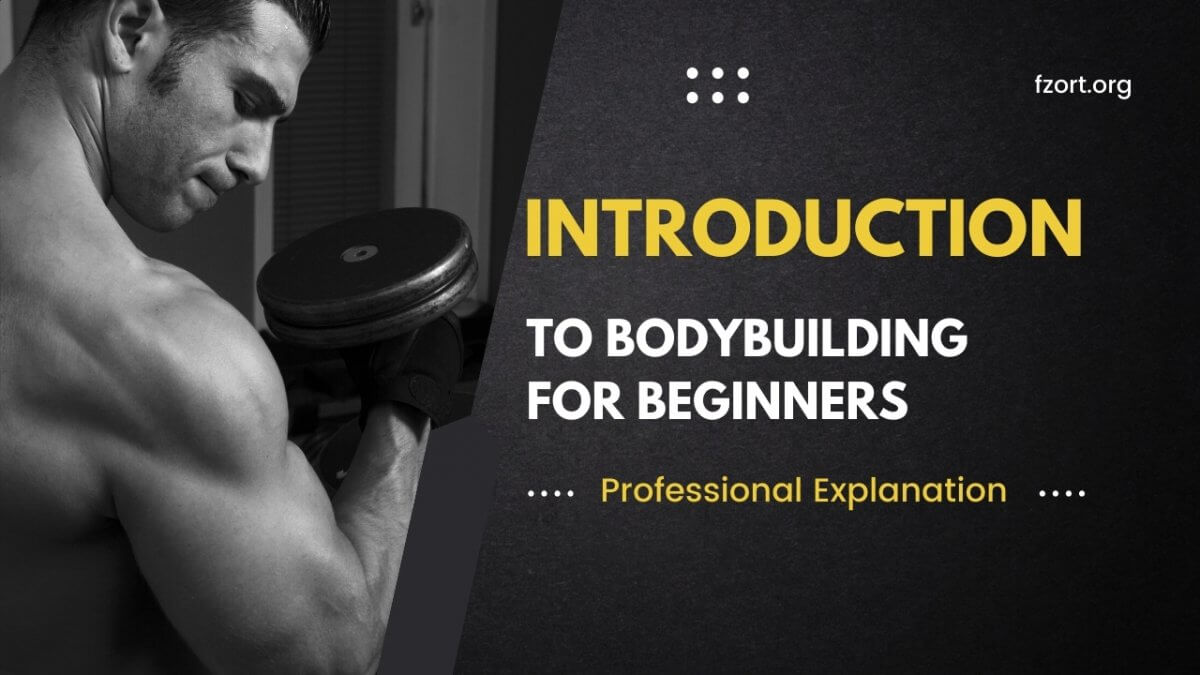Embarking on a bodybuilding journey can be an exciting and transformative experience.
It’s not just about building muscle; it’s about shaping your body, enhancing your health, and boosting your confidence.
This comprehensive guide is designed to help total beginners navigate the initial steps of bodybuilding, offering essential insights, strategies, and tips to set you on the right path.
Understanding Bodybuilding Fundamentals
Bodybuilding is a discipline focused on muscle development through weight training, nutrition, and sufficient rest.
It requires dedication, patience, and a strategic approach to see significant results.
Before diving into the practical aspects, it’s crucial to grasp the core principles that underpin successful bodybuilding:
1. Progressive Overload: Gradually increase the weight or resistance you lift to challenge your muscles and stimulate growth.
2. Nutrition: Eating a balanced diet tailored to support muscle growth and recovery.
3. Recovery: Allowing your muscles time to heal and grow stronger by getting enough rest and sleep.
4. Consistency: Sticking to your training and nutrition plan over the long term to achieve sustainable progress.
Embarking on a bodybuilding journey entails more than just lifting weights; it’s a comprehensive lifestyle adjustment that emphasizes the importance of progressive overload, optimal nutrition, adequate recovery, and unwavering consistency.
These core principles form the backbone of any successful bodybuilding regimen, guiding beginners through the complexities of muscle building and ensuring a balanced approach to physical transformation.
Progressive Overload: The Keystone of Muscle Growth
Progressive overload is not merely about adding more weight to your barbell; it’s a strategic approach to continuously challenge your muscles, compelling them to adapt and grow stronger over time.
This principle can be applied in various ways, such as increasing the weight lifted, altering the number of repetitions or sets, modifying the pace of your exercises, or experimenting with different types of resistance.
The goal is to push your muscles beyond their comfort zone, but in a controlled and gradual manner to minimize the risk of injury.
It’s a delicate balance between pushing your limits and listening to your body, ensuring that each workout slightly exceeds the demands of the previous one, thereby fostering muscle growth and strength gains.
Nutrition: The Fuel for Muscle Synthesis
A balanced diet is the cornerstone of bodybuilding, providing the essential nutrients needed for muscle repair, growth, and overall health, click here for more.
Nutrition in bodybuilding goes beyond mere calorie counting; it involves a thoughtful composition of macronutrients tailored to individual needs.
Protein plays a pivotal role, serving as the building block for muscle repair and growth.
However, carbohydrates are equally important, acting as the primary source of energy to fuel strenuous workouts.
Healthy fats contribute to hormonal balance and nutrient absorption.
A well-rounded diet also includes a variety of vitamins and minerals obtained from fruits, vegetables, and whole foods, supporting bodily functions crucial to recovery and muscle synthesis.
Understanding the symbiotic relationship between diet and exercise is key, as it ensures that your body has the right fuel at the right times to maximize muscle growth and recovery.
Recovery: The Foundation of Strength Building
Recovery is the unsung hero of bodybuilding, often overlooked in the rush to achieve faster results.
Muscle growth occurs not in the gym, but during periods of rest when the body repairs the micro-tears caused by weightlifting.
This process is essential for muscle hypertrophy (growth) and strength enhancement.
Adequate sleep is a critical component of recovery, as it not only facilitates muscle repair but also regulates hormones that influence muscle growth, such as growth hormone and testosterone.
Additionally, incorporating rest days into your routine allows your muscles to recover fully, preventing overtraining and reducing the risk of injury.
Embracing recovery as a vital element of your bodybuilding regimen ensures sustained progress and longevity in the sport.
Consistency: The Path to Lasting Results
Consistency is the glue that binds all elements of bodybuilding together.
It’s about showing up day after day, week after week, with unwavering commitment to your training, nutrition, and recovery plans.
The journey to building muscle and achieving your physique goals is a marathon, not a sprint, requiring patience and perseverance.
Consistency in bodybuilding doesn’t mean rigidly adhering to the same routine indefinitely but rather maintaining a disciplined approach while being flexible enough to adjust your plan as needed.
It’s about making bodybuilding a sustainable part of your lifestyle, ensuring that progress continues over the long term.
By staying consistent, you not only see tangible results but also cultivate habits that contribute to a healthier, more active life.
Incorporating these principles into your bodybuilding journey ensures a well-rounded approach to muscle building, emphasizing the importance of pushing your limits, nourishing your body, allowing time for recovery, and maintaining a steadfast commitment to your goals.

Developing a Bodybuilding Plan
Developing a Bodybuilding Plan
Setting Realistic Goals
Start by defining clear, achievable goals.
Whether it’s gaining a certain amount of muscle mass, achieving a specific look, or improving your strength, having concrete objectives will guide your bodybuilding journey and help you stay motivated.
Creating a Workout Routine
As a beginner, your focus should be on learning proper form and building a foundation of strength.
A balanced routine should include exercises that target all the major muscle groups:
– Upper Body: Focus on compound movements like bench presses, push-ups, and rows.
– Lower Body: Incorporate squats, deadlifts, and lunges to build leg and back strength.
– Core: Engage your core muscles with planks, sit-ups, and twists.
Aim for 3-4 workout sessions per week, allowing for rest days in between to promote muscle recovery.
Nutrition for Muscle Growth
Nutrition plays a pivotal role in bodybuilding.
Consuming enough protein is essential for muscle repair and growth, while carbohydrates provide the energy needed for intense workouts.
Healthy fats support overall health and hormone production.
Consider the following dietary guidelines:
– Protein: Aim for 1.6 to 2.2 grams of protein per kilogram of body weight daily.
– Carbohydrates: Include complex carbs like whole grains, fruits, and vegetables to fuel your workouts and recovery.
– Fats: Incorporate healthy fats from sources like avocados, nuts, and fish.
Hydration is also crucial, so drink plenty of water throughout the day, especially before, during, and after workouts.
Rest and Recovery
Rest days are as important as workout days.
They allow your muscles to repair and grow stronger.
Ensure you’re getting 7-9 hours of quality sleep per night to support recovery and optimize performance.
Tips for Success
1. Start Slow: Gradually increase the intensity of your workouts to avoid injury and burnout.
2. Learn Proper Form: Focus on technique to maximize gains and minimize the risk of injury.
3. Stay Consistent: Stick to your routine, even when progress seems slow.
4. Be Patient: Bodybuilding is a marathon, not a sprint. Sustainable results take time.
5. Seek Support: Consider working with a personal trainer or joining a community of like-minded individuals for guidance and motivation.
Conclusion
Embarking on a bodybuilding journey as a beginner can seem daunting, but with the right approach, it can be incredibly rewarding.
By understanding the fundamentals, setting realistic goals, and following a well-structured plan, you’ll lay a solid foundation for success.
Remember, consistency, patience, and a positive mindset are your greatest assets.
Embrace the process, and enjoy the transformation, both physically and mentally.





